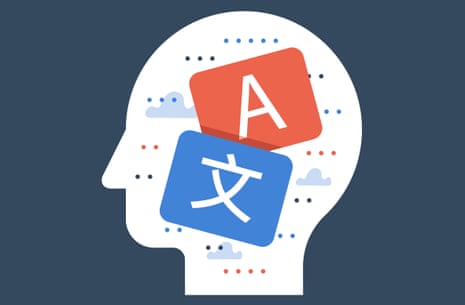Over the past century, perceptions of bilingualism have swung from one extreme to the other. For much of the immediate postwar years, it was thought that a toddler’s brain would struggle to cope with two languages (it would handicap school progress, experts said, and some even believed it could lead to schizophrenia). But from the 1960s onwards, increasingly scientific research (coupled, perhaps, with a greater appreciation of cultural difference) pushed the pendulum a long way in the other direction. It’s now fairly common to hear some extraordinary claims about the benefits of bilingualism.
Albert Costa (a Catalan-Spanish bilingual) died in 2018, and this book is a great testimony to his lifetime of research into the subject. Although peppered with a few technical aspects of neuroscience, it’s very readable: the prose is gentle, anecdotal, witty, personal and – despite the many controversies – balanced. He doesn’t deride monoglots (they have advantages too), but simply invites us to wonder what happens if you double up on what is already an extraordinary human ability – language.
The research results are pretty astonishing. Newborns only hours old can already detect a change of language. By four to six months they are able to distinguish between, say, English and French, only by what they see of the speaker’s mouth. By eight months they can differentiate, by observing those articulatory movements of the lips, between two languages to which they haven’t even been exposed. Babies can “extract statistical regularities” to deduct what, among the flow of sound, are the basic units: our words. It’s called – the jargon is light-touch, but enjoyable – “segmentation strategy” through the use of “transitional probability” (which syllables are usually heard side by side). Most of these results are the consequence of placing electronic sensors in dummies that pick up on babies’ alertness to, and interest in, novelty.
A newborn’s rapid accumulation of phonemes (sounds) also, however, involves perceptual narrowing. As they’re deepening their sound inventory in their own languages, they’re getting less adept at doing it in others. Because it’s thought that the “language store” is one big bucket, not separate cups, the bilingual toddler has to be adept at code-switching, inhibiting one language and green-lighting the other.
That means bilinguals have a “slower and less reliable access to the lexicon than monolinguals”. There is a “change-cost” in which bilingual speakers are – only milliseconds – slower at naming common objects. One would have imagined that the minimal delay would be in sourcing words from the weaker language, but it’s the opposite: “the cost of change”, writes Costa, “is asymmetric: its magnitude is greater for the dominant language than for the non-dominant one (what we call ‘asymmetrical language code-switching’).” Costa is clear about all these micro-drawbacks: it’s a generalisation, but generally true that “bilingual individuals have a smaller vocabulary in their two languages than monolinguals”.
So it’s clear that this isn’t a manifesto claiming bilinguals are geniuses (“don’t worry about whether your opponent in a chess match is bilingual or not,” he quips). But he lists, in detail, why their brains are different: there’s less “egocentric bias” in bilingual children. They are able to see puzzles more easily from another’s point of view (the difference here is as much as 30%). They have greater attentional control: subconsciously ignoring half their brain’s words all their lives means they are less sidetracked by what are called “flanker” distractions, both in experiments and thus, perhaps, in real life. Because of a greater “cognitive reserve”, bilinguals in many trials have reported the onset of dementia up to four years later than their contemporaries.
For those of us who are not bilingual, there are still advantages to language learning. Costa quotes Goethe’s famous line that “he who does not know foreign languages knows nothing about his own”. But the advantages aren’t only cultural breadth or depth, but also better decision-making: we’re less instinctive and kneejerk in a foreign language, more able to be utilitarian and cold-headed. (Asked whether it’s worth pushing a man in front of a train to save five other lives, respondents are more rational than moralistic when considering the question in a non-native language.) There’s less “loss aversion” when we’re navigating quandaries outside our own tongue. People are sometimes aghast that their allegedly rigid morals are malleable according to the words we hear and use, but all the research seems to suggest – and it’s good news for us linguistic exiles – that we reason differently when we’re struggling, however slightly, for the right words.
It’s a charming book. Summarising decades of academic research without being dull, Costa is generous to his peers and gracious where he demurs from their findings. He hedges a lot of bets, as one must in measuring anything inside the human head. But he leaves you in little doubt that the brain of bilinguals is, in tiny but important ways, provably different.
The Bilingual Brain: And What it Tells Us About the Science of Language by Albert Costa, translated by John W Schwieter, is published by Allen Lane (£20). To order a copy go to guardianbookshop.com. Free UK p&p over £15

Comments (…)
Sign in or create your Guardian account to join the discussion